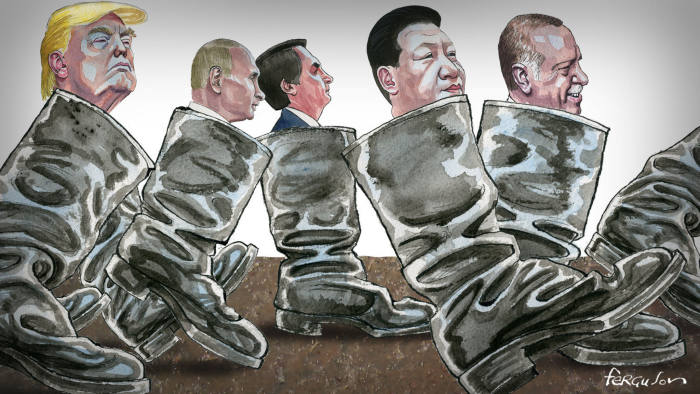Virtually the whole world has congratulated Joe Biden on winning the US presidential elections. The regime in Russia is upset and taken aback. It has been rumoured that the powers-that-be will congratulate Biden on his victory after the approval of the final results, which will only be declared officially in January 2021. Once again the political strategy adopted by Russia’s leadership looks strange and differs unfavourably compared to global trends. However, it is clear that Joe Biden won, as demonstrated by all reliable evidence.

Donald Trump and Joe Biden, 2020 Presidential Debate
While Donald Trump’s defeat will not change the politics of the world’s remaining autocratic leaders, nationalists and populists, Biden’s victory may well boost the confidence of their opponents. The retention of power by the odious Republican would have had an extremely adverse impact, first and foremost in such countries as Russia, whose political system is so remote from democracy.
On a global scale Donald Trump is one of the highest-ranking right-wing nationalists and populists. Other such politicians include Narendra Modi in India, Jair Bolsonaro in Brazil, Viktor Orbán in Hungary, Andrzej Duda in Poland, Recep Tayyip Erdoğan in Turkey, and of course, Vladimir Putin in Russia. Coming to power through such democratic procedures as elections, these individuals fulminate against democracy, pursue any non-conformists, suppress or actually destroy independent mass media, marginalise the opposition and orchestrate extra-judiciary reprisals. Once in power, nationalists and populists enthusiastically talk about the collapse of liberalism and proclaim the emergence of a “sovereign” or “illiberal” democracy to describe the political regimes in their countries. And Donald Trump is not simply one of them: at the presidential elections in November 2020 he won more votes than any US presidential candidate in history (apart naturally from Joe Biden), which is indicative of the vast influence of Trump’s ideology.
Just like other nationalists and populists, Donald Trump adopted emphatic positions: he denounced globalisation, relying on the traditional idea of ethnopopulism based on state support for universal welfare, but only for the “right” types of people (not for “unworthy” migrants and all manner of minorities who are allegedly appropriating these benefits), and incited what was already widespread disbelief about a number of democratic institutions (in particular on the press).
The defeat of the outgoing US President for a number of strategic and ideological reasons will be of concern for a number of European likeminded individuals. During the past four years the US regime has proactively nudged allies in Hungary and Poland to sever relations with the European Union. For example, the Hungarian Prime Minister recently declared: “In the past we thought that Europe represented our future. Today we know that we are the future of Europe”, while leadership in Poland even proposed calling the country’s new military base “Fort Trump”. And you also have Prime Minister Boris Johnson in Great Britain: Trump, himself a major advocate of “Brexit”, boasted that the English had nicknamed their Prime Minister the “British Trump”.
Populist and ultra-right movements in European countries have always had roots of their own. Their influence has grown and waned, regardless of Donald Trump. In France the leader of the right-wing party National Rally Marine Le Pen suffered a crushing defeat to Emmanuel Macron in the French presidential elections in 2017 when the American President was at the peak of his popularity. Now, when Macron is overwhelmed by the COVID-19 pandemic and is highly unpopular, polls show that Marine Le Pen could win the French presidential elections in 2022. In Italy the ultra-right parties built their political platform based on anti-migration rhetoric – a problem that existed before Donald Trump and will remain after he has gone.
It goes without saying that populists and autocrats globally have been slightly disoriented by Trump’s defeat. However, they themselves do not feel vanquished: in their countries they have their own long-standing national-populist traditions, while the vast support for Trump at elections only goes to prove that they can count on powerful ideological allies in the USA. They simply need to sit it out until Biden has served his term.

© James Ferguson, Financial Times
This is all the more true now, as owing to the internet and new digital technologies, together with the deformation of political competition, the quality and professionalism of politicians as state figures no longer plays any major role. Politics needs organisation, implementation and control over performance. Strictly speaking, that is why managers are needed – competent, energetic, decent and adequately motivated. However, today we are presented with a completely different picture, when a boorish, under-educated and psychologically unstable narcissist was chosen to implement a specific programme (deregulation of business, limitations on undesirable immigration, repudiation of cumbersome international obligations).
Donald Trump turned out to be too ignorant, too undisciplined and at the same time too thin-skinned to be effective in politics for a long time. He proved to be colourful populist, but did not have enough political talent and competence to manage effectively and keep his promises. There were no improvements to national infrastructure, workplaces that previously moved to China have not reappeared [in the USA]. Meanwhile, when the pandemic broke out, instead of making the most of the opportunity and demonstrating leadership qualities, unifying the country during a crisis which had originated in China, Trump continued to bicker on Twitter — he did not even understand the opportunity presented to him, failed to cope and lost.
At the same time, Trump managed to achieve one key goal – he “expanded the boundaries” (see “Shock therapy” for America: normalising the absurd, January 2019) and prepared the grounds for the election of the next autocrat and populist as President in the USA. Consequently, in general leadership of the Republican Party has good reason to remain optimistic. Fox News and Wall Street Journal rapidly repudiated Trump, while some Republican leaders condemned his attempts to stop counting votes. They all understand that basically Trump is finished and are more than pleased. The Republican Party has a majority in the Supreme Court, obtaining more seats in the US Congress than it expected, would appear likely to retain control over the Senate, and also expect significant success at regional elections. Today the Republican Party has more women in power and has attracted more support from the “non-white” electorate. What else do they need for the new project?
The real significance of these elections is not that Trump lost, but that the Democratic Party won.
And this is the perfect situation for a capable right-wing nationalist populist who will run for US President in 2024.
When assessing this situation, it is extremely important not to make a mistake: a dangerous precursor of fascism – nationalist populism in the form of Trumpism – has not been stopped: it is merely taking a break to recoup for the transition to the next offensive. The new national-populist leader will not be so awkward and vulnerable. He will hold his post not so much thanks to success as his skills. A leader, who is more balanced and less brazen than Trump, will have all the assets needed for victory. This is exactly how in Holland Thierry Baudet, a new populist on the local political scene, managed with his party Forum for Democracy to pick up half the supporters of the most renowned extreme right-wing populist Geert Wilders. Baudet simply learned all the artifices of his rival and performed them more professionally.
As a general rule, the situation in the world and the elections in the USA starkly show that the “Trumpist” direction in politics is even self-sustainable and flourishing.
Democracy globally is in the midst of a serious crisis similar to the one experienced by mankind in the middle of the 20th century. This is reflected in the Open Letter of Concern from more than 80 scholars of authoritarianism and fascism from the USA, Great Britain, Israel and Italy.
The scholars write: “Whether Donald J. Trump is a fascist, a post-fascist populist, an autocrat, or just a bumbling opportunist, the danger to democracy did not arrive with his presidency and goes well beyond November 3rd, 2020.
While democracy appeared to be flourishing everywhere in the years following the end of the Cold War, today it seems to be withering or in full-scale collapse globally. As scholars of twentieth century authoritarian populism, fascism, and political extremism, we believe that unless we take immediate action, democracy as we know it will continue in its frightening regression, irrespective of who wins the American presidency in early November.”
In actual fact the post-war political structure in the USA and countries in Western European guaranteed the co-existence and balancing of the interests of different communities – class, professional, cultural, ethno-confessional and other groups. At the same time each community was to varying degrees organised vertically: within the communities you would find hierarchical links, authoritative and informal leaders who would communicate with other communities and the authorities. And this is precisely what made the system sustainable and functional. Any violation of vertical links within the communities (facilitated to a large extent by the internet and the resulting opportunities for mass interactive communications) also weakened the actual system.
If the flag of democracy is being used today to continue promoting militant dilettantism and ignorance, resolve complex fundamental issues by appealing to a crowd mentality (and a crowd mentality — outside the field of professional democratic politics — represents the masses ,which differs from civil society, just as Lynch law differs from trial by jury), then populism will come to the fore — and a couple of iterations later — fascism, albeit in a high-tech form. However, the essence of fascism is that one elite group circumvents all the rest to appeal to the crowd and then, drawing on the support of the masses, rounds up other elite groups and forces them to toe the line.
And the present is a particularly favourable environment for such a development. Authoritarian leaders will be able to exploit the consequences of this relentless pandemic — from chronic unemployment and security issues to rising government debt and racial conflicts. Meanwhile, the leaders themselves exacerbate the situation, downplaying the threat posed by the virus and politicising public health measures. And all this is being at a time when not a single global issue (climate change, environmental pollution, inequality, the arms race, terrorism) has become less complicated and critical.

Armed Trump’s supporters, Maricopa, Arizona, November 2020 // Ross D. Franklin, AP
In general, one cannot assess seriously the results of the US presidential elections and discuss prospects going forward, without touching on a whole range of topics related to rapid changes in our lives. This concerns, inter alia, the fragmentation and segmentation of society, a desire of people to confine themselves to their secure spots in social networks, in order to assess any information solely from the comforts of their own convictions. Searches for the underlying reasons for the current situation in the world lead one to question human ability to master the benefits of the information communications and technology revolution.
The specifics of today are that in order to respond adequately to modern challenges, you need a responsible politician, a rational civil society, social solidarity and trust, but this is all rapidly disappearing from our lives.
You can read about the world’s current and future political systems, about the new economy and human society against the backdrop of an information communications and technology revolution, and also about ways out of this global dead end in a new series of articles entitled “Political Entropy” in the coming weeks on the website yavlinsky.ru.



